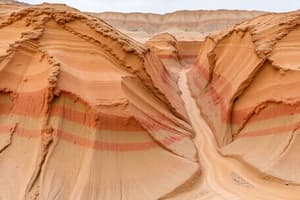Podcast
Questions and Answers
What concept is referred to as the uniformity of process in geology?
What concept is referred to as the uniformity of process in geology?
- Revolutionism
- Transformationism
- Catastrophism
- Uniformitarianism (correct)
Which law helps geologists determine the relative age of rocks by considering their position in horizontal layers?
Which law helps geologists determine the relative age of rocks by considering their position in horizontal layers?
- Law of Lateral Continuity
- Principle of Original Horizontality
- Principle of Cross-Cutting Relationships
- Principle of Superposition (correct)
What is the estimated age of the Earth according to geologists?
What is the estimated age of the Earth according to geologists?
- 2.3 billion years old
- 4.6 billion years old (correct)
- 6.9 billion years old
- 5.6 billion years old
Which era represents the earliest period and covers around 85% of Earth's history?
Which era represents the earliest period and covers around 85% of Earth's history?
What type of fossils are used to date or measure the age of rocks due to their short-lived existence?
What type of fossils are used to date or measure the age of rocks due to their short-lived existence?
What geological process led to the formation of the Arbuckle Mountains?
What geological process led to the formation of the Arbuckle Mountains?
What caused the water to recede in the area described?
What caused the water to recede in the area described?
Which of the following best describes the relationship between a predator and its prey?
Which of the following best describes the relationship between a predator and its prey?
Which of the following is an example of a primary consumer?
Which of the following is an example of a primary consumer?
Which of the following is an example of a secondary consumer?
Which of the following is an example of a secondary consumer?
What is the role of a decomposer in an ecosystem?
What is the role of a decomposer in an ecosystem?
Flashcards are hidden until you start studying
Study Notes
Uniformitarianism and Geological Processes
- Uniformitarianism is the concept that geological processes that exist today, such as weathering, erosion, and deposition, also occurred in the past.
- Weathering, erosion, and deposition are processes that alter Earth's features.
- Deposition builds horizontal layers of sediments.
Geologic Time Scale
- The Law of Superposition helps geologists determine the relative age of rocks, with older layers at the bottom and newer layers at the top.
- The age of the Earth is estimated to be 4.6 billion years old.
- The geologic time scale is divided into eras: Precambrian (earliest – 85% of Earth's history), Paleozoic (542 million years ago), Mesozoic (251 million years ago), and Cenozoic (65.5 million years ago to present).
Eras and Periods
- Devonian period: occurred 416-359 million years ago and is represented by rocks in the Camp Goddard area.
- Cretaceous period: occurred 145-65 million years ago and is represented by rocks in the Fort Worth area.
Fossils
- Fossils are formed through the process of fossilization.
- Index fossils are used to date or measure the age of rock and are characterized by living for a relatively short period of time.
- Trilobites are an example of an index fossil.
Geologic Events and Formations
- The Arbuckle Mountains were formed as a result of geologic pressure, uplifting, and folding of rock layers.
- The area experienced erosion and ocean coverage, followed by uplifting and water recession.
- The mountains that formed in this region once rivaled the Alps in elevation.
Ecosystems and Relationships
- Predator-prey relationships are important links in food webs, where one species eats another.
- Primary consumers are organisms that consume producers (e.g., herbivores).
- Secondary consumers are organisms that consume primary consumers (e.g., carnivores).
- Decomposers feed on dead and decaying plant or animal matter (e.g., soil microbes).
Studying That Suits You
Use AI to generate personalized quizzes and flashcards to suit your learning preferences.



